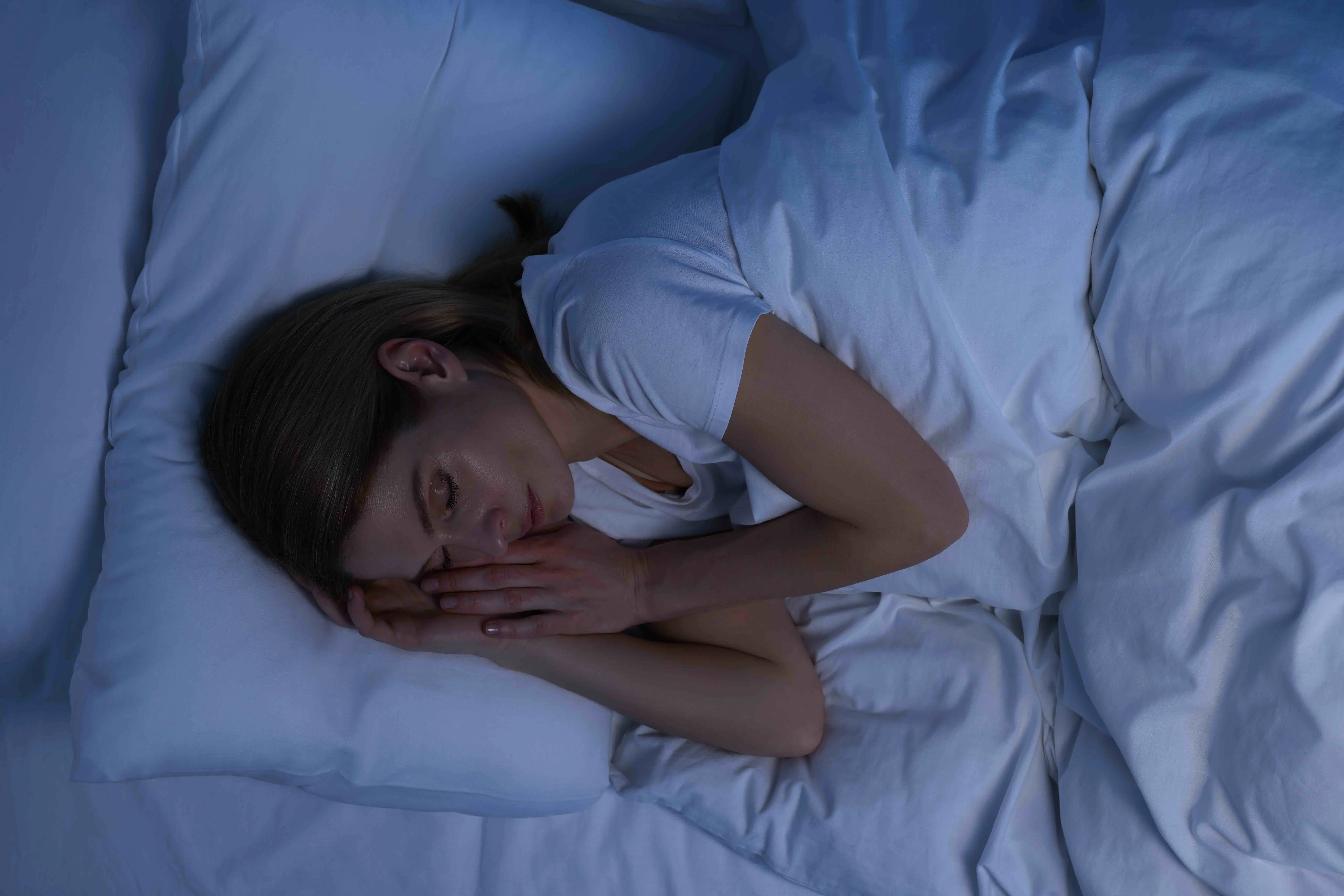Healthy Sleeping Habits: How To Prioritise A Good Night’s Sleep
And why good sleep hygiene practices are more important than you think.

February 7, 2020 - Updated August 11, 2025

We’ve all had a rough day that we’ve chalked up to a bad night’s sleep the night before. After all, how you sleep can affect how you feel, physically and mentally, and while maintaining good sleeping habits can be difficult at times, getting a night of solid shut-eye starts with your daily habits and with some simple adjustments to your daytime routine, you can improve how you sleep at night.
Find out how exercise and sleep go hand-in-hand, why prioritising bedtime is so important and some healthy habits you can develop to guarantee a restful night’s sleep.

Why is sleep so important and what are the benefits?
Sleep is an essential bodily function that plays a critical role supporting everything from your immune system to metabolism, memory and mood, according to Harvard Health.
The amount of sleep we need changes as we get older, with seven to nine hours of sleep recommended for adults. But the focus doesn’t just need to be on how much you’re getting, but how well you’re sleeping.
According to the CDC, quality sleep is all about refreshing, uninterrupted sleep. While that might not feel possible for people in certain seasons of their lives (parents of young children, we’re looking at you!), some signs of poor quality sleep to be mindful of include:
Having trouble getting to sleep
Getting up repeatedly throughout the night
Waking up and still feeling tired despite the length of your sleep.
Some of the benefits of quality sleep include:
More energy
According to Harvard Health, your REM (rapid eye movement) and non-REM sleep are both important for energy levels, but it’s the last stage of your non-REM sleep that plays the most significant role. This stage of deep sleep promotes repair and enhances your body’s ability to produce its energy molecule, ATP. When you’ve experienced this slow-wave sleep, you’ll wake up feeling more refreshed than if your sleep were interrupted during the night.
Better mood
A good night’s sleep can help regulate your mood and emotions, with one study finding sleep has a greater impact on your mood than the impact your mood has on your sleep.
The relationship between sleep and mood is well documented, but the negative impact that poor quality sleep and deprivation can have goes far beyond grumpiness and irritability. Columbia University’s Department of Psychiatry have highlighted that poor sleep can contribute to the onset and worsening of mental health conditions such as depression and anxiety.
John Hopkins Medicine has also pointed to the link between depression and sleep, saying that amongst people with depression 75% have trouble falling or staying asleep, while the risk of developing depression is higher for those who suffer from insomnia.
Greater focus and concentration
From a poor attention span to slowed down reaction times and concentration, the Sleep Foundation has drawn comparisons between excessive sleepiness and being affected by alcohol. After all, sleep helps to improve your cognitive ability (aka how your brain functions).
The American Academy of Sleep Medicine says when you get enough rest, you’ll think more clearly and creatively, perform better with problem-solving and support your memory.

Improved athletic performance (and recovery!)
An added bonus? When you feel rested, your coordination and athletic performance may also improve. When it comes to your body’s ability to smash out a Sweat session, a good night’s sleep is definitely something to prioritise - regardless of your fitness level. According to the Sleep Foundation, sleep promotes cardiovascular health by allowing your heart to rest and cells and tissues to repair and also helps your body produce cytokines, an infection fighting hormone that plays a key role in your immune system.
One study has found that poor sleep can impact a number of elements of physical performance, from impaired muscle strength and speed to an increased risk of injury. If you’re not getting enough sleep, your recovery can also suffer, which can lead to delayed-onset muscle soreness (DOMS).
If you find yourself regularly suffering from DOMS, prioritising sleep can be a simple way to speed up your muscle and tissue recovery.
Promotes better eating habits and metabolic health
Harvard’s School of Public Health explains that a lack of sleep may increase hunger and appetite, including late-night snacking and high-fat and high-carb food intake, while research from the Mayo Clinic has also suggested there may be a link between sleep restriction and obesity.
As the National Heart, Lung and Blood Institute highlights, your body handles fat according to the circadian clocks of your liver, fat and muscle, and not getting enough quality sleep can lead to increased food consumption, higher levels of the hormones that control your hunger levels, decreased ability to respond to insulin, less physical activity and incidences of metabolic syndrome.
Decreased risk of certain health conditions
Sleeping well can reduce your risk of health issues such as metabolic syndrome (or insulin resistance syndrome) - a group of conditions that raise your risk of serious health problems including stroke, diabetes and coronary heart disease.
It’s not just the more serious conditions that sleep can influence. Sleep influences different parts of your immune system and the NIH says that not getting enough sleep can also make you more susceptible to the common cold and other infections.

Daily habits that can improve your sleep
There’s plenty you can do throughout the day and in the lead up to bedtime to make the most of your nightly rest.
Manage stress
According to the American Psychological Association, stress is the biggest cause of short-term sleep problems. But the good thing is there are some simple ways you can manage your stress levels for better sleep including keeping active, eating healthily, journaling and relaxation techniques like restorative yoga and meditation.
Your state of mind has a huge impact on your ability to unwind at the end of the day (and can lead you to lying awake for hours after you had planned to go to sleep). Meditation and mindfulness techniques can help to manage stress and reduce any feelings of anxiety throughout the day, which can help you to sleep better at night.
Take time off from technology
Creating a bedtime routine that takes you away from your computer, phone and TV can do wonders for your health. Australia’s Sleep Health Foundation says that technology use at night can interfere with your sleep due to the bright light or activities you might be doing on the devices, with one study finding that using screens in bed is associated with a 59% increase in insomnia symptoms and a reduction in sleep duration. If technology is something you regularly turn to before bed, you might feel more alert, mentally stimulated or end up going to sleep later than you should.
Some ways to limit your technology use before bed include reading a book, focusing on self-care with a nightly skincare routine or writing in a gratitude journal. If you find your phone is too much of a distraction, try charging it in another room overnight and using an old-school alarm clock!
Exercise regularly
Experts at Johns Hopkins Medicine say that evidence has proven working out can help you fall asleep more quickly and improve your sleep quality — and all you need is 30 minutes of physical activity each day.
Exercising close to bedtime can keep some people up at night, but for others, it doesn’t make a difference, so it’s best to listen to your body to determine the ideal time of day to work out for optimal sleep.

Get some sunlight
According to the Centers for Disease Control and Prevention, the light and dark cycles of the sun help regulate your circadian rhythm (sleep-wake cycle) and can affect how alert you are at different times of the day. After waking up, try to get outside (or, at the very least, open the blinds to let the light in!) and if you spend a lot of time indoors, making sure you are exposed to as much natural light as possible throughout the day can help to regulate your sleep patterns.
Nap only when you need to
Napping is a good way to make up for lost sleep, especially for shift workers or new parents — but a long nap, napping after 2 pm, or spending the entire day in bed may prevent you from getting the rest you need come bedtime.
The National Sleep Foundation recommends limiting your afternoon naps to 20 minutes to help you feel refreshed and maximise your chances of resting well that night.
Embrace a healthy, balanced diet
It can be difficult to get to sleep if your stomach is rumbling or if you’ve eaten a large meal close to bedtime. A 2017 review on diet and sleep found certain foods, micro and macronutrient intake and deficiencies may affect your sleep quality.
The American Sleep Association recommends eating a well-balanced diet that includes foods rich in calcium, potassium, magnesium, tryptophan and B6 such as poultry, fish, bananas, wholegrains, yoghurt and kale.
Keep a regular schedule
It’s not always possible to wake up and go to bed at the same time each day, but following a consistent schedule with your morning and evening routine across your weekdays and weekends can help to stabilise your circadian rhythm and ensure you’re getting enough rest.
Avoid caffeine before bed
Caffeine is a stimulant, increasing activity in the brain and central nervous system and in turn affecting how you function during the day and how well you sleep at night.
A 2018 article found that while having caffeine during the day can promote a number of benefits such as improving cognitive function and physical performance, consuming it as long as six hours before you go to bed can significantly disturb your sleep.
While everyone is different and the long-term tests are still being conducted to accurately report on the effects of caffeine and sleep quality, it pays to be aware that consuming caffeine before bed (and for some people in the afternoon) may not help you fall asleep with ease.
Worried you’re not getting enough sleep?
Whether it’s a rising sleep debt, the chaos of juggling family life or a busy schedule you can’t get a handle on, the body really does keep the score when it comes to your sleep. Making changes to your routine to prioritise a good night’s rest is one of the best things you can do for your wellbeing, and your workout routine will thank you for it, too.

A more empowered you starts with Sweat, and our editorial team is here to bring you the latest fitness tips, trainer recommendations, wellbeing news, nutritional advice, nourishing recipes and free workouts.
* Disclaimer: This blog post is not intended to replace the advice of a medical professional. The above information should not be used to diagnose, treat, or prevent any disease or medical condition. Please consult your doctor before making any changes to your diet, sleep methods, daily activity, or fitness routine. Sweat assumes no responsibility for any personal injury or damage sustained by any recommendations, opinions, or advice given in this article.
Wellbeing